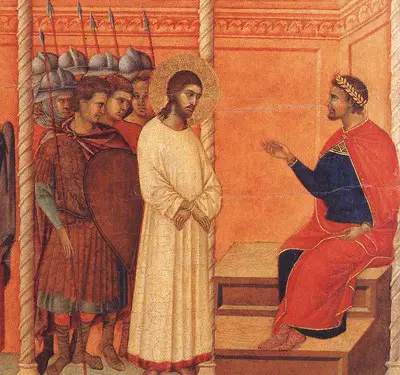
from Homily 39, “On the Passion of Our Lord Jesus Christ,” by St. Philaret of Chernigov
When Pilate heard of Galilee, he asked whether the Man were a Galilean (Luke 23:6).
Pilate had no doubt of Jesus’ innocence. But at the same time, not only did personal advantage mean far more to him than Divine truth, but his own personal peace and quiet was dearer to him than people’s rights. He was happy to grab onto anything, if only to cease his struggle with the Sanhedrin over the truth. “Is He a Galilean?” asked Pilate, addressing the fact that during its slanders the Sanhedrin mentioned Galilee. When he heard that Jesus came from Galilee, he hastened to make use of this for his own aims.
The Romans had a law which stated that a criminal must be judged by the head of the province to which he belonged. They carried out this law when they wanted to, and Pilate had less respect for this law than anyone, especially with respect to Herod, since not long before this Pilate had put many Galileans to death without having had any dealing with Herod, the ruler of Galilee. Now Pilate decided to make use of this law in order to send Jesus to Herod.
Pilate was happy at this thought even more because, as he thought, he was taking care of two things simultaneously: he was saving himself the trouble of dealing with the Sanhedrin and, in showing courtesy to Herod, he would be able to make up with him, since the latter had been offended by his action against the Galileans (cf. Lk. 13:1).
Such was Pilate’s trial of Jesus! Pilate had assured himself of Jesus’ innocence and acknowledged His innocence in the hearing of the Sanhedrin. However, did he free Jesus from judgment? No, he had only made use of Jesus’ case for his own purposes. May God deliver us from the misfortune of seeing judges like Pilate. Pilate remained cold toward that Divine truth which is so necessary for our immortal souls.
Such is the worldly man. Worldly occupations and the routines of life lull the best strivings of his soul to sleep. From morning till evening, occupied with the everyday affairs of life, with cares about life’s conveniences, about pleasures and entertainment, he forgets about his higher calling, about the needs of his better nature. Little by little he reaches the point where he no longer considers it necessary to worry or think about eternal truths. Only for the sake of variety, for entertainment, during his free time or in unavoidable instances, does he think about faith, while at other times he considers all reasonings about eternal truths to be superfluous and fruitless, as though heaven were lower than earth, and eternity were cheaper than time.
What are his rules of life? Instead of virtues, he respects worldly sense; instead of piety, propriety. What a pitiful, terrible state of soul! In such a state everything that is best in the human soul is given over to murder; man is lowered to the level of irrational beasts. Wake up, unfortunate soul! Come to yourself, lost daughter of heaven! A dread eternity awaits you beyond the grave! After the last breaths of your natural life you will appear at the Judgment before Him who created you.
Gather your thoughts, distracted by the objects of the world, that they might dwell on you yourself and think about your state and your destiny. It is impossible for an immortal soul not to sense, not to admit that sensual life is too low, too filthy, utterly unworthy. It is impossible not to sense and admit that the good things of the earth, no matter how much we delight in them, will not fill our spirit, for our spirit strains and yearns for other goods, for another, better fatherland. It languishes with a hunger for goods that do not pass quickly, like waves or dreams.
Your situation is the situation of the lost son, who has spoiled his father’s possessions, who has used all the best gifts of heaven for evil and is dying of starvation. Go to your Father and say to Him with all sincerity: Father, I have sinned against heaven, and before Thee (Luke 15:18). Go, and do not listen any longer to your self-love, which finds the degradation you have gained through your light-mindedness difficult to see. Go to your Father. He is waiting for you; He will receive you. Amen.
